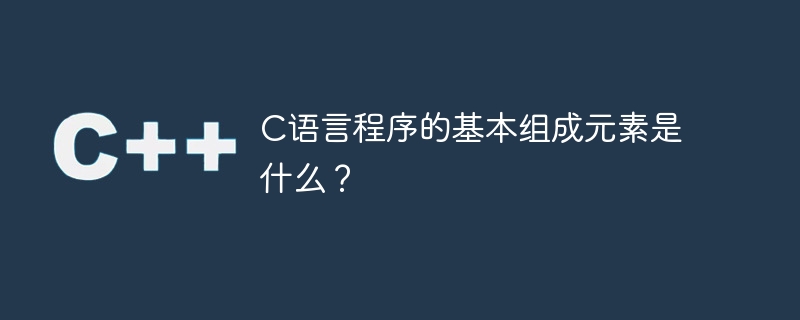Home >Backend Development >C++ >What are the basic components of a C language program?
What are the basic components of a C language program?
- PHPzOriginal
- 2024-02-19 14:18:071384browse

What are the basic elements of a C language program?
C language is a high-level programming language widely used to develop software and systems. Its flexibility and efficiency make it the first choice of many programmers. Understanding the basic elements of a C language program is the first step to learning and mastering the language. In this article, we will introduce the basic elements of C language programs to help readers better understand and use C language.
- Function:
In C language, multiple functions can be defined to complete different tasks. A function is one of the basic building blocks of a program and can contain a series of statements to accomplish a specific function. The execution of a C language program usually starts with the main() function, and is then executed according to the calling relationship between functions. - Variables:
Variables are containers for storing data. They can save different types of data, such as integers, floating point numbers, characters, etc. In C language, variables must be declared and their type specified before they can be used. Variable names can be a combination of letters, numbers, and underscores, but they must begin with a letter or an underscore. - Constant:
Constant is a fixed value in the program and cannot be modified during program execution. Constants can be integers, floating point numbers, characters or strings, etc. In C language, you can use the const keyword to declare a variable as a constant to prevent it from being modified. - Operators:
C language provides various operators for performing operations on variables and constants. Common operators include arithmetic operators (such as addition, subtraction, multiplication, division), relational operators (such as equal to, greater than, less than), logical operators (such as and, or, not), etc. They can be used to perform mathematical calculations, comparisons, and logical judgments. - Control structure:
The control structure is used to control the execution order of statements in the program. C language provides control structures such as if statements, for loops, while loops and switch statements. By using these control structures, the program can execute different code blocks according to different conditions to achieve flexible control flow. - Array:
An array is a special type of variable used to store multiple values of the same type. It can store multiple data in a single variable and access each element in it by index. In C language, the length of an array must be specified when declaring it, and the index of the array starts from 0. - Pointer:
A pointer is a variable that stores the memory address of a variable. By using pointers, data in memory can be accessed and manipulated indirectly. Pointers are very important in C language. They can be used to dynamically allocate memory, pass parameters and implement data structures. - Structure:
Structure is a custom data type used to combine multiple variables of different types. A structure can organize a group of related data together and access it through a variable. In C language, structures can be defined using the struct keyword.
The above are the basic elements of C language program. Mastering these basic elements can help us write C language programs with clear structure, efficiency and reliability. However, it should be noted that for beginners, it may take some time and practice to understand and master these concepts. Therefore, it is recommended to read more relevant textbooks and reference materials and conduct actual programming exercises to deepen their understanding of the C language and Application Ability.
The above is the detailed content of What are the basic components of a C language program?. For more information, please follow other related articles on the PHP Chinese website!

